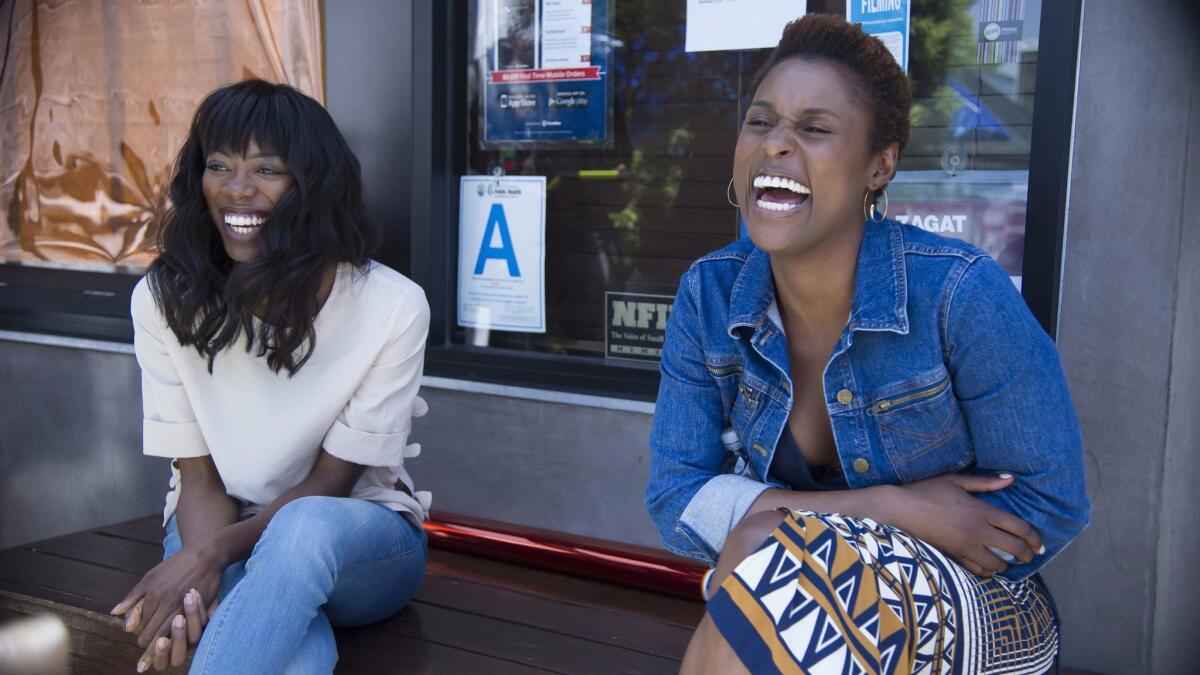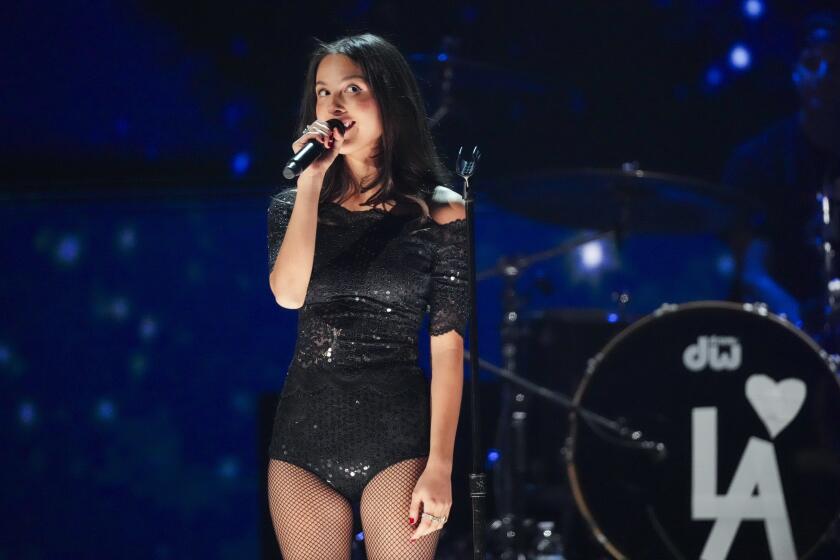Yvonne Orji plans to put the immigrant struggle into a sitcom

“Insecure” star Yvonne Orji.
- Share via
As Issa’s best friend Molly on “Insecure,” Yvonne Orji was catapulted into the spotlight, helping to diversify media representations of black women with a character that was at once educated and driven, and complex and messy. Considering her career goals, she’s on the right track already.
How did you get into comedy?
I entered the Miss Nigeria in America pageant — yes, it’s a thing that existed. This was when I was getting my masters. I had a dress, knew how to walk and was smart, so I could answer a final question, but I did not have a talent. And the last thing I remembered playing on the piano was “Mary Had a Little Lamb” and that wasn’t gonna win me no pageant. So I got down on my knees and prayed like, “God. I just took out a Macy’s credit card to get this dress. I need a talent.” And it was my first [credit card], so I was like, “What is credit?” I spent $200 on this dress, so I left the tag on and took it back, because that is what you do when you’re a broke college student.
And then loud as day I heard the Holy Spirit say: “Do comedy.” I was like “You better stop playing. This is Yvonne that’s talking to you, the daughter that's not the comedian.”
He was like, “Cool. What else you got?”
And when God starts asking you rhetorical questions, you know what’s up. Then I was like I’m either going to trust him or I’m not. I just started writing what's funny about being Nigerian in America. Before I knew it, I had five minutes of stuff my mom or dad would say, and people were laughing [at the pageant]. After that, people wanted to know if I did weddings. I then started doing paid corporate shows and because I was clean, I was getting a lot of work.
Chris Rock actually got on me because I said comedy is my gateway drug [to acting]. He was like, ‘It's not a gateway drug. It’s heroin.'
— Yvonne Orji

Was acting ever an actual goal?
It was. For me, comedy was deftly terrifying. It was exhilarating because when you’re good, you're good, but then there are those off days where you’re like, “I don’t know what's wrong with the crowd, because this worked yesterday” — those moments where you're being super defensive and want out. TV was always going to be my safe spot.
Chris Rock actually got on me because I said comedy is my gateway drug [to acting]. He was like, “It's not a gateway drug. It’s heroin.” He was basically saying that it's not a stepping stone. But I was looking to him and
What was your first time on an actual comedy stage like?
In 2007, DC Improv had this competition called DC’s Funniest College Student. They went around to all the schools in the DMV area and because I was getting my master’s I counted as a student. I entered for George Washington University and ended up winning. They then take two winners from the colleges and put them against each other. It was about 16 of us total at the finals.
I was the only girl, and I didn’t win, but I remember coming off the stage and there was an Asian and Indian man. They said that I was really funny and to keep doing what I was doing. I was imitating my parents and talking about the immigrant struggle and they were like “That’s our mom, just a different accent.” That's when I realized the universality of humor.
And when we go to pitch the show that I’m creating, “First Gen,” that’s what we say: “It’s your mom, just with a different accent.” The people who get it and understand say they can see that.
When you told your family that you wanted to be a comedian, how did they respond?
My dad was like, [in a Nigerian accent], “Oh! So you want to be a jester? At 40 years old, will you be performing onstage with a baby on your back?”
That visual was not what I desired for my life, but it got me to stop and think about it for a second, and I realized it was a really good point. Ali Wong did it very well but that's just not my testimony. So I came up with a game plan, setting up what life looks like for Yvonne Orji and how to transition this into something that allows me to eat.
Tell us more about why you want to do your sitcom idea “First Gen,” about a Nigerian girl who, similarly to yourself, gave up a medical career to do stand-up.
I’m a proud Nigerian. I know y’all think it’s us sending you those emails. It’s not, it’s Ghana. [laughs] But part of my success story is that I’m Nigerian and my parents raised me to believe I can do whatever. Like, I want to own a comedy club. I want to tell [the story of] “First Gen” because Africans are so misunderstood. When I meet an African American, for example, they think we think we're better than them. But it’s like, “All I said was ‘Hi.’”
But also, it ain’t no competition. I think I’m better than everybody — and not in a bad way but in the way that my dad always said, “If the white man does it, do it better. If the Asian man does it, surpass it.” My father just instilled in me that either you’re going to be No. 1 or nothing at all. I’m just trying to be the best version of me.
Get your life! Follow me on Twitter (@TrevellAnderson) or email me: [email protected].
The biggest entertainment stories
Get our big stories about Hollywood, film, television, music, arts, culture and more right in your inbox as soon as they publish.
You may occasionally receive promotional content from the Los Angeles Times.








